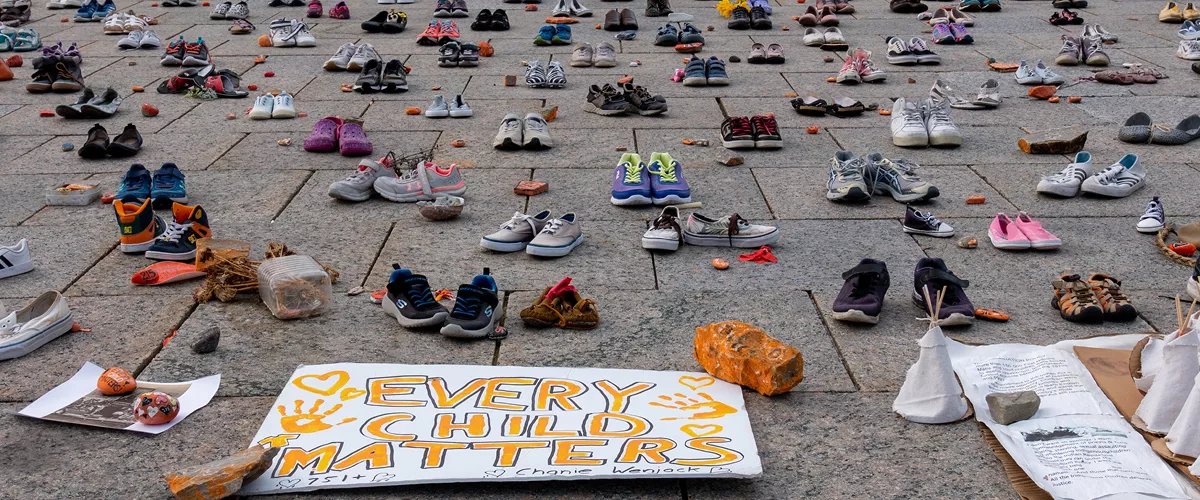Indigenous Relations and Reconciliation
June is National Indigenous History Month and June 21 is National Indigenous Peoples Day
The City of Vaughan has proclaimed June as National Indigenous History Month and National Indigenous Peoples Day on June 21 to honour and recognize Indigenous peoples and history in Vaughan and across Canada. Indigenous History Month is an opportunity to recognize and learn about the traditions, languages, art, music, storytelling and histories of First Nations, Métis and Inuit people across the country and promote understanding, reconciliation and respect for Indigenous cultures.
Vaughan is situated on the territory and Treaty 13 lands of the Mississaugas of the Credit First Nation. These lands are also the traditional territory of the Huron-Wendat and the Haudenosaunee. Vaughan is currently home to many First Nations, Métis and Inuit people today. During Indigenous History Month, the City proudly honours the rich heritage and vibrant cultures of Indigenous peoples in Canada and acknowledges their unique roles and stewardship of these sacred land we call home.
National Day for Truth and Reconciliation and Orange Shirt Day
Each year, Sept. 30 marks the National Day for Truth and Reconciliation and Orange Shirt Day. It is a day of sombre reflection for settlers and Survivors to do the difficult, reflective work of decolonizing thoughts and actions, and a reminder of the need for ongoing discussion and work towards the Truth and Reconciliation Commission of Canada: Calls to Action (PDF).
The day also honours survivors, their families, and First Nations, Métis and Inuit communities. The annual commemoration of the history and legacy of residential schools will remain a vital part of the reconciliation process. People are encouraged to wear orange shirts to recognize the individual, family and community inter-generational impacts of residential schools, as well as witness and honour the healing journeys of the Survivors and their families. It is a call to action to foster a city, province and nation where every child matters.
On Sept. 30, flags at all City facilities were lowered to half-mast. At Vaughan City Hall, the ‘Every Child Matters’ flag was flown at half-mast and the building was illuminated orange that evening in observance. Residents were encouraged to watch the live national broadcast from Parliament Hill as the National Centre for Truth and Reconciliation, in partnership with CBC/Radio-Canada and the Algonquin Nation, memorialized the children lost to the residential school system and honour Survivors and their families.
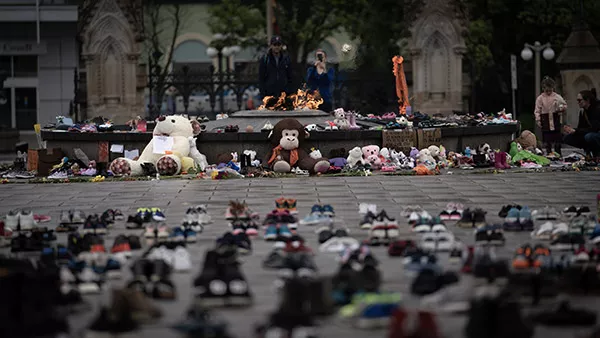
Sisters in Spirit Day
October 4 is Sisters in Spirit Day. It is a day to honour the lives of missing and murdered Indigenous women, girls and Two-Spirit people, support grieving families, and create opportunities for healing. The ongoing violence experienced by Indigenous women, girls and Two-Spirit people in Canada is a human rights crisis and unacceptable.
You can observe the day by:
- taking a moment of silence for the victims and their loved ones.
- sharing words of support on social media using #SISVigils and #MMIWG.
- familiarizing yourself with the MMIWG Calls for Justice (PDF).
Indigenous women, girls and gender-diverse people are strong and beautiful. They are mothers, daughters, sisters, aunties, and grandmothers. For years, First Nations, Metis and Inuit communities have called attention to the alarming number of missing and murdered Indigenous women, girls, and Two-Spirit people in Canada. Since the onset of colonialism, Indigenous women have faced life-threatening, gender-based violence and disproportionately experience violent crimes because of hatred and racism. Current and historical factors, such as the impact of the 60s Scoop and residential schools, have resulted in generational trauma and contribute to the ongoing violence and particular vulnerabilities of Indigenous women, girls and Two-Spirit people in Canada.
Indigenous women and girls have the right to be safe and free from violence. To learn more, please visit the National Inquiry into Missing and Murdered Indigenous Women and Girls.
About Residential Schools
Residential schools systematically undermined First Nations, Métis and Inuit cultures across Canada and disrupted families for generations, severing the ties through which Indigenous culture is taught and sustained, and contributing to a general loss of language and culture. Because children were removed from their families, many grew up without experiencing a nurturing family life and without the knowledge and skills to raise their own families. The devastating effects of the residential schools are far-reaching and continue to have a significant impact on Indigenous communities.
The City joins communities from coast to coast to acknowledge the suffering endured by thousands of First Nations, Métis and Inuit children sent to residential schools, as well as their families and communities.
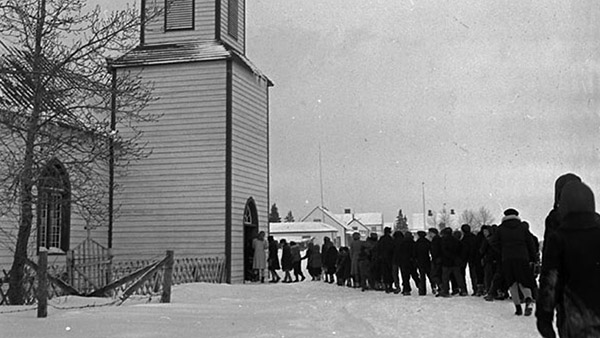
Image of students walking in the snow to a service at St. Thomas Anglican Church, Moose Factory Island, January 1946; Government of Canada Library and Archives Canada.
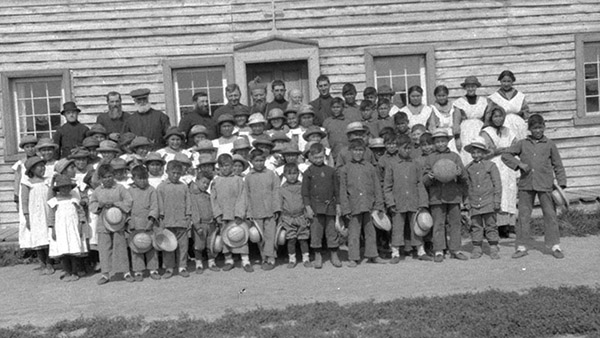
Image of students standing in front of Fort Providence Indian Residential School, Northwest Territories, Canada, 1920; Government of Canada Library and Archives Canada.
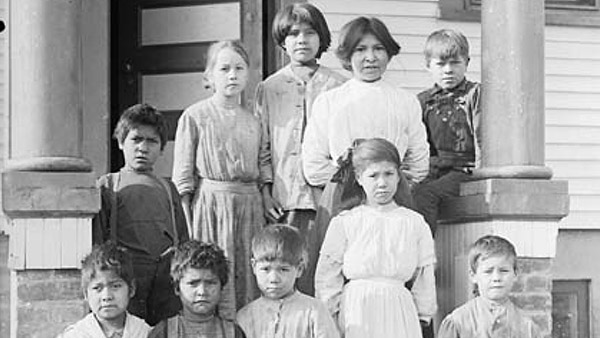
Image of students standing in front of an unidentified school, vicinity of Woodstock, New Brunswick, date unknown; Government of Canada Library and Archives Canada.
Further actions by the City
At a Committee of the Whole meeting in June 2021, Members of Council endorsed an amendment to address existing inaccuracies with the City’s Indigenous Land Acknowledgement. This included changing the title from “Aboriginal Territorial Acknowledgement” to “Indigenous Land Acknowledgement,” in addition to a revised statement. The timing of this amendment coincided with the City’s recognition of National Indigenous History Month in June and National Indigenous Peoples Day on June 21, both of which were proclaimed by Vaughan Council.
Additionally, the City developed a Diversity, Equity and Inclusion Strategy and multi-year action plan (PDF). This strategy and action plan aims to identify and address systemic discrimination and inequities in access to services, community participation and civic engagement. The strategy also highlights working with Indigenous and equity-seeking groups to counter historical, attitudinal, structural, systemic and institutional practices that inhibit inclusivity, and developing a strategic plan to foster a meaningful relationship with Indigenous communities, advancing reconciliation.
Contact Information
Strategic Initiatives Portfolio – Inclusion and Community Outreach
Phone: 905-832-2281
Location:
Vaughan City Hall
2141 Major Mackenzie Dr.
Vaughan, ON L6A 1T1

